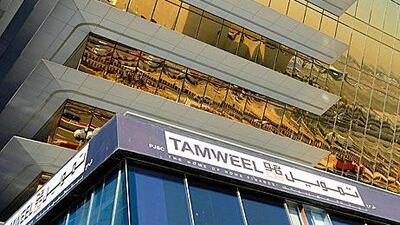MARRAKECH // Dubai's property crisis bottomed out in the second quarter and the Government should now focus on "soft issues" such as taxes and residency rules to help it compete globally, says a senior official.
Sheikh Khaled bin Zayed Al Nehayan, who holds several senior posts in Dubai business including the chairmanship of Tamweel, the Islamic mortgage company, was speaking on the sidelines of the World Economic Forum in Morocco where Dubai's prospects were a topic for discussion.
Default rates at Tamweel, which once accounted for one third of the national mortgage sector, peaked at 4.8 per cent in the second quarter and have now fallen back to 3.8 per cent, said Sheikh Khaled. Default rates are a key indicator for property price expectations.
"People who bought at the peak are still paying," he said. "They are interested to keep their property and we don't see a huge sign of deterioration in our portfolio.
"These numbers show me that the market is stabilising … We see that it will stabilise at this level going forward for the next one year."
Dubai World's debt restructuring agreement was a critical factor in the recovery, Sheikh Khaled added.
"When the Dubai World restructuring was finished we saw the turnaround because we saw that during the summer things deteriorated, but after the announcement things started to improve," he said.
Property prices have fallen by about half in some places from the peak at the end of 2008, while the UAE economy as a whole contracted by 1.3 per cent last year.
Sheikh Khaled, who is also the vice chairman of Dubai Islamic Bank and the chairman of Bin Zayed Group, poured cold water on forecasts showing large numbers of new units still coming into the Dubai market. Some predictions overestimate supply because projects had been scaled back or stopped as contractors were not being paid, he said.
"If you look at the statistics of Dubai Municipality on how many units have been finished, you see that the number is much smaller than it used to be and the market can tolerate these numbers. So there is no glut coming up," Sheikh Khaled said.
Dubai has already built enough "hardware" in terms of housing, offices and infrastructure. Now it needs to focus on the "soft issues" such as laws, services and incentives, which require talent but not new money, he said.
Dubai has built up more than US$80 billion (Dh293.83bn) in debt during a six-year boom and recently returned to the capital markets for the first time since the crisis. Dubai should now consider raising tax revenue and adjusting its residency rules, Sheikh Khaled said.
Dubai has no corporation or income tax but a raft of licence fees and tolls provide the government with revenue.
"Every government has some form of taxation but unfortunately we are so spoilt in the region because we are used to zero income and corporate tax. So realigning the taxation to a structure where it is fair and equitable and does not disrupt business, I think that is only going to be happening," he said, adding that a "pay as you play" tax is the most likely.
Residency rules, which allow skilled workers a maximum three-year visa, should also be extended to five years for workers who bring value to the economy. But any new system would require testing, Sheikh Khaled added.
"People used to say, 'Why would anyone go to Dubai?' When we opened the gate, we were flooded. Now if you adjust something, you never know the reaction," he said.

